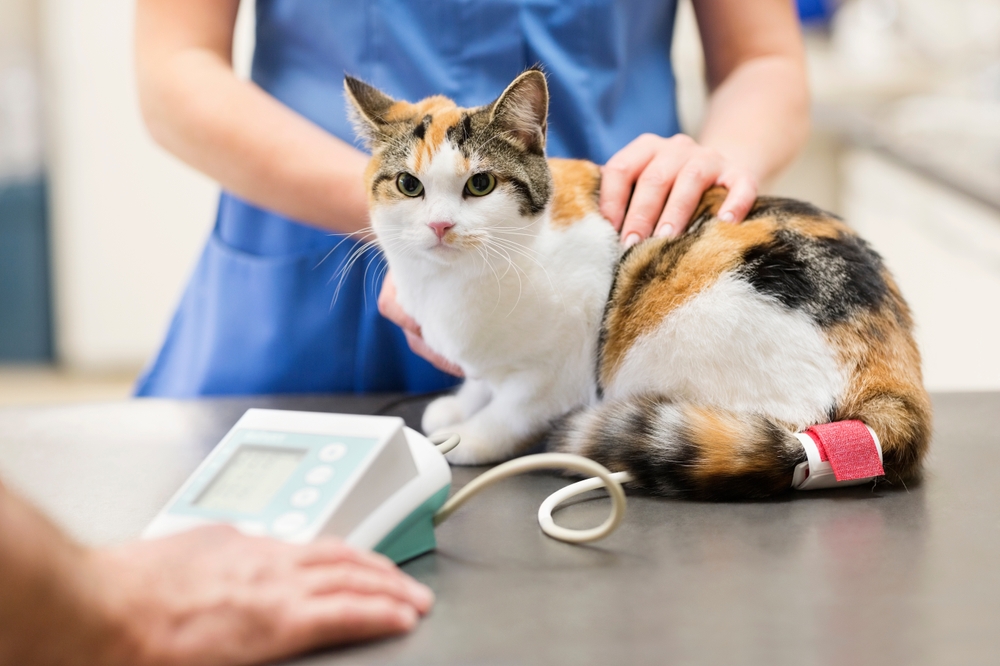Routine health monitoring, including diagnostic screening tests, is critical to your pet’s health. Our Westerville Veterinary Clinic team believes in a forward-thinking approach, and we answer frequently asked questions (FAQs) about these evaluations.
Question: Why is wellness diagnostic screening important for my pet?
Answer: Your pet’s health status influences their quality of life. Routine wellness diagnostic screening has numerous benefits, including:
- Establishing a baseline — While normal laboratory ranges are established for dogs and cats, each pet’s diagnostic readings are unique. By establishing your pet’s healthy baseline, our team can detect subtle changes in your pet’s values.
- Tracking trends — By tracking your pet’s diagnostic values, we can observe trends that could mean their health is compromised.
- Detecting early disease — Because pets are extremely skilled at hiding illness, wellness diagnostic screening tests are important to help our team detect conditions in the early stages, typically providing a better prognosis for your four-legged friend. In one study, wellness diagnostic testing detected health issues in one in seven seemingly healthy adult pets, one in five seemingly healthy senior pets, and two in five seemingly healthy geriatric pets. When diagnosed early, conditions, such as kidney and liver disease, can be managed to improve your pet’s quantity and quality of life.
- Establishing a relationship — Our team enjoys getting to know you and your pet, and regular wellness visits help us nurture this relationship.
- Preventing emergency situations — By detecting health conditions at an early stage, our team can help prevent your pet from experiencing emergency situations, which can be frightening as well as expensive.
- Providing peace of mind — Knowing your pet’s wellness diagnostic tests are normal provides you with peace of mind.
Q: What is included in my pet’s wellness diagnostic screening?
A: Our Westerville Veterinary Clinic team recommends screening tests based on your pet’s age and disease risk. We may recommend the following wellness diagnostic screening tests:
- Complete blood count (CBC) — A CBC evaluates your pet’s erythrocytes (i.e., red blood cells), leukocytes (i.e., white blood cells), and thrombocytes (i.e., platelets). Abnormalities in these values can indicate infection, inflammation, blood loss, chronic stress, and clotting disorders.
- Biochemistry panel — A biochemistry panel is a comprehensive assessment that evaluates electrolytes, blood glucose, proteins, and your pet’s organ health. Many pets who have chronic disorders, such as kidney and liver disease, exhibit no illness signs, and an abnormal value on their biochemistry panel helps our team detect these issues early in the disease process. If abnormalities appear on your pet’s biochemistry profile, we may recommend further diagnostics to assess your pet’s condition.
- Fecal check — Intestinal parasites are common in pets, and some can also infect humans. Fecal analysis helps our team detect dangerous intestinal parasites such as hookworms, whipworms, roundworms, Giardia, and Coccidia. We may ask you to bring in your pet’s fresh stool sample to perform a fecal examination.
- Vector-borne disease testing — The American Heartworm Society recommends annual heartworm testing for all dogs, including those receiving year-round heartworm protection to ensure their coverage is effective. These tests can also detect tick-borne diseases such as Lyme disease, anaplasmosis, and ehrlichiosis.
- Urinalysis — A urinalysis provides valuable information about your pet’s health, and can help us detect conditions such as diabetes, kidney disease, urinary tract infections (UTIs), and urinary stones.
- Thyroid panel — Senior dogs are at risk for hypothyroidism, while senior cats have an increased hyperthyroidism risk. Therefore, our team often recommends a thyroid panel as part of a senior pet’s wellness diagnostic screening.
- Blood pressure evaluation — Senior pets, especially those with heart disease and kidney dysfunction, also have a high blood pressure risk, and we may recommend evaluating your pet’s blood pressure.
- Cancer screening — If your dog has a cancer risk, we may recommend a cancer screening test that can detect seven common canine cancers.
Q: How often does my pet need wellness diagnostic screening?

A: We consider numerous factors, such as their age and whether they have a pre-existing health condition, when deciding how often your pet needs diagnostic screening. General recommendations are:
- Puppies and kittens — The American Heartworm Society recommends testing puppies for heartworms at 7 months and 1 year of age. In addition, puppies and kittens should have a CBC and biochemistry panel performed before they are anesthetized for their spay or neuter procedure.
- Adult pets — Our team should regularly evaluate your adult pet, and they should receive wellness diagnostic screening at least once per year.
- Senior pets — Because senior pets have an increased health complication risk, we recommend testing them at least every six months.
Annual or biannual wellness diagnostic screening is vital to keep your pet as happy and healthy as possible. To ensure your four-legged friend receives routine health evaluations, contact our Westerville Veterinary Clinic team and schedule an appointment time that works for you.







Leave A Comment